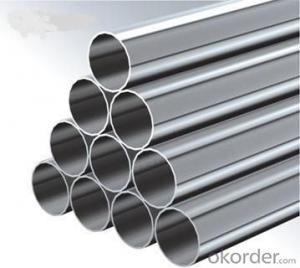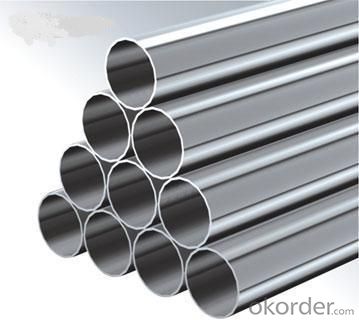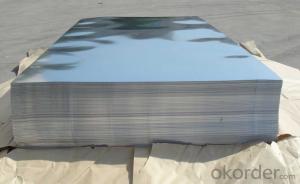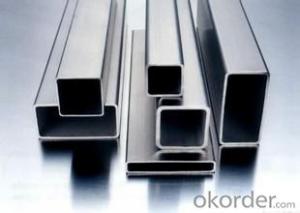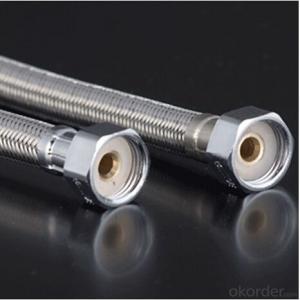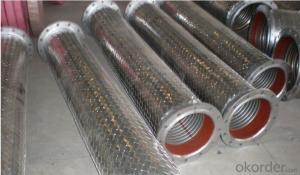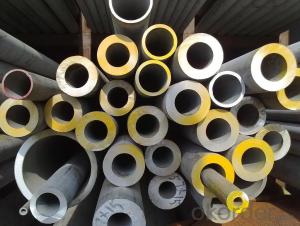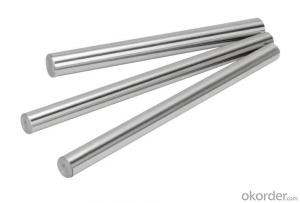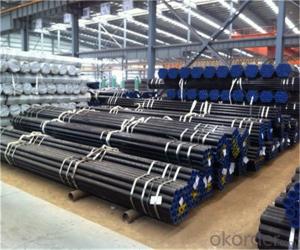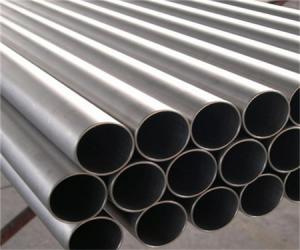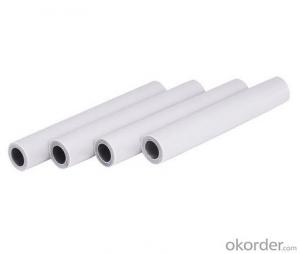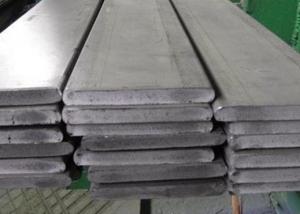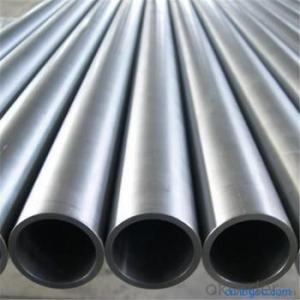304 stainless steel welded polished pipe
- Loading Port:
- Shanghai
- Payment Terms:
- TT OR LC
- Min Order Qty:
- 50 m.t.
- Supply Capability:
- 3000 m.t./month
OKorder Service Pledge
OKorder Financial Service
You Might Also Like
Specification
304 stainless steel welded polished pipe
Some details of our products
Product: stainless steel pipe
Grade:304;316
Standard:ASTM,AISI,JIS,EN,DIN,GB
Surface treatment:8k, ba
Thickness:1.0-60mm
Outer Diameter6-630mm
Productivity:800MT/Month
Products range Industrial tube, decorative tubeProcessing: Stainless steel pipe
There are high-tech equipments to processing stainless coils and sheets/plates with skilled workers.
Cut to length
Decoiling and slitting
Grinding and brushing
Film protection
Plasma and water jet cutting
Folding and embossingProduct show
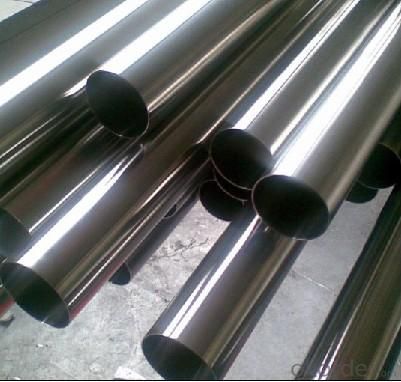
5.RFQ
1.small quantity, short time delivery
If we have stocks, the delivery time is less than 7 days,If the quantity is more than 500Tons,the delivery time is abou 30 days after confirming the order.
2.Choose the appropriate metals stainless steel for your needs.
We carefully balance quality, delivery time and price,procure various grades metals from all over the world.
3.Lower total cost
We taking your processing into account,offer you reduce a total cost by using our product.
We assure you:
Small MOQ + Cheap Price + Fantastic Quality + Fast Delivery
- Q: Can stainless steel pipes be insulated for soundproofing?
- Yes, stainless steel pipes can be insulated for soundproofing. Insulation materials such as rubber or foam can be wrapped around the pipes to reduce noise transmission. The insulation helps to absorb or dampen the sound waves traveling through the pipes, thus minimizing the noise produced.
- Q: What is the difference between 304H and 304 stainless steel pipes?
- The main difference between 304H and 304 stainless steel pipes is the carbon content. 304H contains a higher carbon content, which enhances its high-temperature strength and resistance to sensitization. This makes 304H suitable for high-temperature applications, such as in refineries and power plants, where it can withstand elevated temperatures without losing its mechanical properties. On the other hand, 304 stainless steel pipes have a lower carbon content, making them more suitable for general-purpose applications that do not require high-temperature resistance.
- Q: How do you calculate the pipe length required for a specific application?
- To calculate the pipe length required for a specific application, there are several factors that need to be considered. 1. Flow Rate: Determine the desired flow rate or the amount of fluid to be transported through the pipe per unit of time. This can be measured in gallons per minute (GPM), liters per second (L/s), or any other appropriate unit. 2. Pipe Material: Identify the material of the pipe that will be used for the application. Different materials have different friction coefficients, which will affect the overall length required. 3. Friction Loss: Calculate the friction loss in the pipe based on the flow rate and the material properties. This involves determining the friction factor for the specific pipe material and using the appropriate equation (such as Darcy-Weisbach equation or Hazen-Williams equation) to calculate the friction loss. 4. Pressure Drop: Consider the desired pressure drop across the pipe. This is typically specified by the application requirements or system design. The pressure drop can be calculated using the Bernoulli's equation or other relevant equations. 5. Pipe Diameter: Determine the appropriate pipe diameter based on the desired flow rate and the allowable pressure drop. This can be done by using pipe sizing charts or equations specific to the pipe material and the flow characteristics. 6. Pipe Length Calculation: Once the pipe diameter is known, calculate the length required based on the desired flow rate, pressure drop, and the friction loss. This can be done using various pipe sizing equations or software tools available for the specific pipe material. 7. Additional Factors: Consider any additional factors that may affect the pipe length calculation, such as elevation changes, fittings, valves, or other components in the system. These factors may introduce additional friction losses or pressure drops that need to be accounted for. It is important to note that pipe length calculations are typically performed by engineers or professionals with expertise in fluid mechanics and pipe system design. Consulting relevant codes, standards, and guidelines specific to the application is also recommended to ensure compliance with safety and performance requirements.
- Q: What is the welding procedure for stainless steel pipes?
- The welding procedure for stainless steel pipes typically involves a few key steps to ensure a strong and durable joint. Firstly, it is important to select the appropriate welding process for stainless steel, which is often Tungsten Inert Gas (TIG) welding due to its ability to produce clean and precise welds. Before beginning the welding process, the stainless steel pipes should be thoroughly cleaned to remove any contaminants, such as dirt, grease, or oxidation. This can be done using a degreasing agent or a stainless steel wire brush. Next, the pipes need to be properly aligned and fitted together. It is important to ensure that the gap between the pipes is even and consistent throughout the joint. This can be achieved by using clamps or tack welding to temporarily hold the pipes in place. Once the pipes are properly aligned, the TIG welding process can begin. This involves using a TIG torch to create an electric arc between a tungsten electrode and the stainless steel pipes. The arc generates intense heat, which melts the edges of the pipes and creates a fusion between the base metal and the filler material. During the welding process, it is crucial to maintain a stable arc length and control the welding speed to achieve a uniform weld bead. The use of a foot pedal or a remote control can help regulate the heat input and control the welding parameters. Throughout the welding process, it is important to protect the weld area from contamination. This can be done by using shielding gas, such as argon, to create an inert atmosphere around the weld zone. The shielding gas prevents the weld area from reacting with oxygen and other atmospheric elements, which could lead to defects in the weld. After completing the weld, it is recommended to perform post-weld cleaning and inspection. This involves removing any slag or spatter that may have formed during the welding process and visually inspecting the weld for any defects, such as cracks or discontinuities. In summary, the welding procedure for stainless steel pipes involves cleaning the pipes, aligning and fitting them together, TIG welding with proper arc length and welding speed, shielding the weld area with inert gas, and performing post-weld cleaning and inspection. Following these steps will ensure a strong and reliable weld joint for stainless steel pipes.
- Q: Can stainless steel pipes be cut to length?
- Yes, stainless steel pipes can be cut to length. Stainless steel is a versatile material that can be easily cut using various methods such as sawing, cutting wheels, or plasma cutting. The specific method used will depend on the thickness and diameter of the pipe, as well as the desired precision of the cut. It is important to use the appropriate tools and techniques to ensure a clean and accurate cut.
- Q: Stainless steel pipe drilling?
- Stainless steel itself is not high hardness, but it is difficult to processing reasons:Because the stainless steel contains C element is low, hardness is not high, and not easy to deformation, plasticity is poor, this is the iron and steel organization grain concentration caused by. This allows the drill to increase its viscosity when drilling, and it is not easy to chip out. The drill is easy to burn at this time. Through the practice comparison, we know that the opening of 135 degree bit is much easier when the control speed is 300-500 to /min. It is much easier than the drilling of 118 degree hole on the same material.
- Q: What are the common applications for stainless steel pipes?
- Stainless steel pipes have a wide range of applications due to their durability, corrosion resistance, and high strength. Some common applications for stainless steel pipes include plumbing, oil and gas transportation, chemical processing, food and beverage production, pharmaceutical industries, automotive manufacturing, construction, and architecture.
- Q: Are stainless steel pipes suitable for extreme temperatures?
- Yes, stainless steel pipes are suitable for extreme temperatures. Stainless steel is known for its excellent heat resistance properties, making it a popular choice for applications that involve high temperatures. Stainless steel pipes can withstand both extremely high and low temperatures, making them suitable for a wide range of industries such as oil and gas, chemical processing, power generation, and aerospace. The high chromium and nickel content in stainless steel alloys contribute to their ability to resist corrosion and oxidation, allowing them to maintain their structural integrity even under extreme temperature conditions. Additionally, stainless steel pipes have low thermal expansion and contraction rates, ensuring that they can withstand thermal cycling without significant distortion or damage. Overall, stainless steel pipes are a reliable and durable option for handling extreme temperatures.
- Q: What is the difference between the stainless steel pipe welded pipe and seamless pipe?
- Grain size: usually, the grain size of the metal is related to the heat treatment temperature and the time at which the metal is kept at the same temperature. Therefore, the welded pipe and seamless tube annealing of the same grain size. If the minimum tube cold treatment, the grain size of the weld metal is smaller than the grain size, welding or grain size is the same.
- Q: Are stainless steel tubes and galvanized steel tubes the same?
- Galvanized steel pipe is common steel pipe, and then the surface coated with a layer of zinc coating, in order to prevent rust, as long as the surface layer is ground, it will rust.
Send your message to us
304 stainless steel welded polished pipe
- Loading Port:
- Shanghai
- Payment Terms:
- TT OR LC
- Min Order Qty:
- 50 m.t.
- Supply Capability:
- 3000 m.t./month
OKorder Service Pledge
OKorder Financial Service
Similar products
Hot products
Hot Searches
Related keywords
